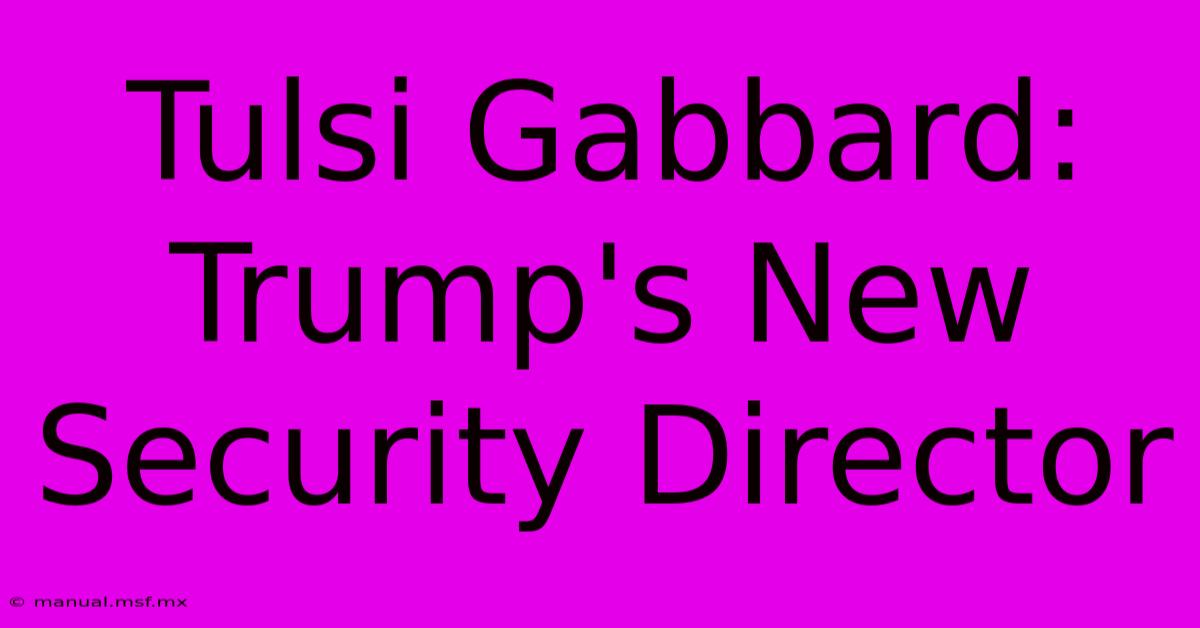Tulsi Gabbard: Trump's New Security Director

Discover more detailed and exciting information on our website. Click the link below to start your adventure: Visit Best Website. Don't miss out!
Table of Contents
Tulsi Gabbard: Trump's New Security Director? A Look at the Speculation and the Reality
Is Tulsi Gabbard the next National Security Advisor? This idea, while intriguing, is based on speculation and not confirmed by any official sources. Let's explore the whispers, the potential, and the likelihood of this scenario, examining both the political realities and the practical implications.
Editor Note: This article analyzes the possibility of Tulsi Gabbard assuming the role of National Security Advisor under the Trump administration, examining the arguments for and against such a scenario. Understanding the dynamics at play is essential for comprehending the potential shifts in US foreign policy.
The idea of Gabbard becoming Trump's security advisor has sparked debate. Some see it as a bold move, potentially bridging the divide between the Republican and Democratic camps. Others view it with skepticism, questioning the compatibility of their ideologies and past stances on issues.
Why is this topic important to read? Understanding the potential for a shift in US foreign policy under Trump requires understanding the possible players involved, particularly those with contrasting ideologies. This article will analyze the political landscape, exploring the potential implications of such a move and its impact on US national security.
Analysis: To analyze this scenario, we need to look at Gabbard's history, her political leanings, and her potential for working with the Trump administration. We'll also examine the key aspects of the National Security Advisor role and how they might intersect with Gabbard's beliefs.
Key takeaways of Tulsi Gabbard's potential appointment:
| Aspect | Description |
|---|---|
| Ideological Alignment | Potential for ideological friction |
| Foreign Policy Experience | Gabbard's foreign policy expertise |
| Political Feasibility | The likelihood of the appointment |
| Impact on US Foreign Policy | Potential shifts in approach |
| Public Perception and Reactions | Potential impact on public opinion |
Tulsi Gabbard: A Rising Figure
Gabbard's background, from her time as a soldier in Iraq to her service in Congress, provides insight into her perspective. Her stance on issues like foreign policy and national security has been the subject of much scrutiny, often viewed as diverging from the mainstream Democratic party.
Ideological Alignment
Gabbard's positions on foreign policy have often been described as more "realpolitik" than the traditional liberal stance. She has advocated for a more nuanced approach to US foreign policy, emphasizing diplomacy and non-interventionism.
This potentially contrasts with the Trump administration's "America First" approach, which has often been characterized by a more unilateral and assertive posture on the world stage. While the differences are apparent, there are also points of potential convergence, particularly regarding an aversion to "endless wars."
Foreign Policy Experience
Gabbard's military experience and Congressional service offer a unique blend of practical and political insight. She has served on the House Foreign Affairs Committee, gaining a deep understanding of the complexities of US foreign policy. Her experience in Iraq also gives her a firsthand understanding of the realities of war and the importance of diplomacy.
Political Feasibility
The feasibility of Gabbard's appointment as National Security Advisor hinges on several factors. It requires a significant shift in the current political climate, potentially necessitating a compromise from both sides. Furthermore, the appointment would likely face opposition from within both the Republican and Democratic parties.
Impact on US Foreign Policy
If Gabbard were to become the National Security Advisor, it could potentially lead to shifts in US foreign policy, particularly regarding the approach to foreign conflicts. Her emphasis on diplomacy and non-interventionism could influence the administration's stance on issues like the Syrian civil war and the war in Afghanistan.
Public Perception and Reactions
The appointment of Gabbard as National Security Advisor would likely spark a public debate, with reactions ranging from enthusiasm to skepticism. Her past criticisms of the Democratic party, combined with her perceived independent spirit, could lead to a divided public opinion.
Conclusion
The potential appointment of Tulsi Gabbard as National Security Advisor under the Trump administration presents a complex and intriguing scenario. While the possibility remains largely speculative, understanding the dynamics at play is crucial to grasping the potential shifts in US foreign policy. Gabbard's unique perspective and experience, combined with the Trump administration's evolving approach to global affairs, could lead to significant changes in US foreign policy.

Thank you for visiting our website wich cover about Tulsi Gabbard: Trump's New Security Director. We hope the information provided has been useful to you. Feel free to contact us if you have any questions or need further assistance. See you next time and dont miss to bookmark.
Also read the following articles
| Article Title | Date |
|---|---|
| Gina Schumacher Feiert Liebe Mit Iain | Nov 14, 2024 |
| Tribune Carton Rouge Welmant Sur La Vie | Nov 14, 2024 |
| Taylor Swift Toronto By The Numbers | Nov 14, 2024 |
| T20 Victory India Beats South Africa | Nov 14, 2024 |
| Resolute Ceo Held In Mali Mining Dispute | Nov 14, 2024 |
| Wembanyama Sets Career High With 50 Points | Nov 14, 2024 |
| Whoopi Goldberg Financial Problems Backlash | Nov 14, 2024 |
| Gaetz Trumps Choice For Us Attorney General | Nov 14, 2024 |
| Wagner Verletzt St Pauli Stuermer Muss Ausgewechselt Werden | Nov 14, 2024 |
| Bell Layoffs Continuation Of Earlier Trends | Nov 14, 2024 |
